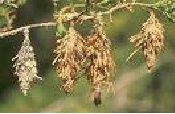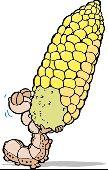Natural Solutions to Things That Bug You (32 page)
Read Natural Solutions to Things That Bug You Online
Authors: Myles Bader


Adult Bagworm Moth
BURP ‘EM
The Burpee Company, Inc. sells a pheromone trap that is prepared specifically for your bagworms.
HERBAL SPRAY
1 Pound of quassia chips
1 Gallon of water
Place the quassia chips in the water and allow it to stand overnight then strain and dilute with water in a ratio of 1:10. Add a small amount of liquid soap and spray. The quassia chips are available at most garden supply stores.
CABBAGE LOOPER

Identification:
These little white-striped green caterpillar critters just love broccoli, kale, kohlrabi, radishes, turnips, peas, cabbage and cauliflower plants.
Their body forms a loop as they travel along. You can easily identify the looper by its
“humpback”
appearance. The moth is brown with silver markings on the center of each wing.
General Information:
They tend to feed on the underneath sides of the leaves. They lay their greenish-white eggs singly on the upper surface of the leaves. To stop them from laying their eggs on your plants, just plant onion sets around the area totally surrounding your plants. The loopers will not come near a garden that has an onion fence around it. Space the onion sets about 4 inches apart for the best results.
BEGONE CABBAGE LOOPERS
For natural control of cabbage loopers it is best to release trichogramma and lacewings. If you want to get rid of them in a hurry then dust or spray with Bt or NPV from your garden supply or agricultural store. Best to begin spraying once a week after the moths or butterflies start appearing.
A SOUR SOLUTION
If your cabbage has been infested, just make some sour milk by adding 4 teaspoons of white vinegar per cup of milk to turn it sour. Spray or sprinkle the mixture over the heads of cabbage to get rid of the bugs.
HERE A LITTLE, THERE A LITTLE
This is an oldie but a goody! Prepare a mixture of ¼ cup of table salt with ½ cup of all-purpose flour then place the mixture into a large saltshaker and sprinkle the cabbage during the growing season. It is best to do this a few times and not depend on just once to do the trick.
ASHES WORK GREAT
Wood ashes can be sprinkled on the leaves to repel the cabbage loopers as well as the imported cabbageworms. This is an excellent method and won’t hurt the plant.

TIDES IN
Ocean saltwater; is used very effectively by many farmers to kill the cabbage loopers and their eggs as well as stopping the caterpillars from eating the leaves. Cabbage plants can tolerate the salt from a spray of saltwater.
THIS REALLY ISN’T CORNY
If you sprinkle cornmeal or rye flour on cabbage plants the caterpillars will eat it and soon die. This is a very safe method of controlling these pests.

A CANOPY OF LEAVES
If you place geranium leaves over the cabbage plants it will deter a number of pests including the cabbage looper.
GIVE THEM A LAXATIVE
Try placing a small squirt of mineral oil into the tip of each ear of corn to smother the worm. This should be done after the silks are starting to wilt and turn brown. You can also add a small amount of cayenne pepper to the oil for an extra charge.
TIGHT HEADS KEEP THEM AWAY
There are a few varieties of cabbage that have very tight heads, which the bugs do not like. These are Mammoth Red Rock, Savoy Chieftain and Savoy Perfection Drumhead cabbage.
PLANTS THAT REPEL
If you plant any of these plants near your cabbage you will not have a problem with loopers. They are onion, garlic, celery, tansy, hyssop, mint, sage, rosemary, tomato or thyme.
CABBAGEWORM
PUT SALT ON THEIR TAIL
 One of the best methods to stop cabbageworms is to spray them with a solution of 1 ounce of table salt in 2 gallons of water.
One of the best methods to stop cabbageworms is to spray them with a solution of 1 ounce of table salt in 2 gallons of water.
The salt may damage your plants, so be careful where you spray. Salt will also stop plant growth.
CABBAGE WORM CURE
The following ingredients will be needed:
½ Cup of table salt
1 Cup of all-purpose flour
Place the ingredients in a small dish and mix well. Sprinkle the powder on the plants early in the morning when the plants still have some dew on them.
CORN ARMYWORM
Identification:
 These are around 2 inches long and light tan or dark brown in color. They also have; orange, yellow or dark brown contrasting stripes.
These are around 2 inches long and light tan or dark brown in color. They also have; orange, yellow or dark brown contrasting stripes.
General Information:
The damage to the corn may appear in the form of chewed leaves and the damage usually appears on the edges of the leaves. They will eventually bore into the ear of corn and set up housekeeping until there is no more to eat before they move to a new ear.

SPRAY THOSE NEMATODES
Spraying Nc nematodes early in the season will help reduce the number of bugs. If you see a borehole it would be best to inject the nematodes directly into the hole. You can also hand pick them by making a slit next to the borehole.
KILL THEM WITH GRAPEFRUIT!
1 Whole grapefruit
2 Cups of boiling water
2 Cups cool tap water
Grind up the grapefruit in a food processor and add the mixture to the boiling water. Allow it to remain overnight then strain and add the cool water before you spray. When sprayed on the plants it will stop caterpillars and most beetle larvae from chomping on your plants.

